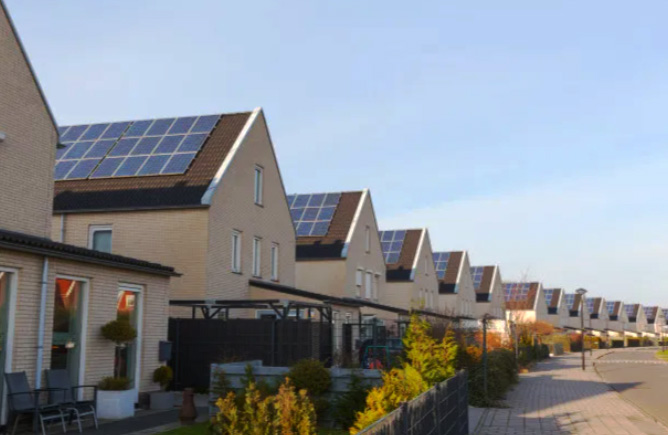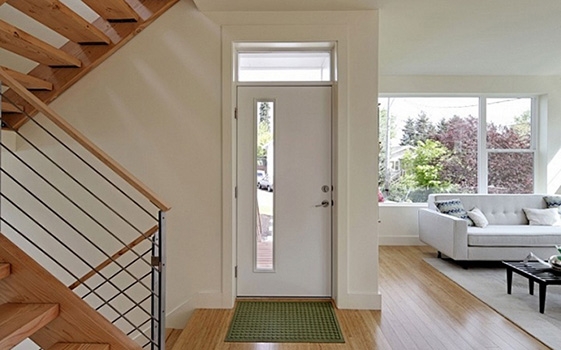With growing global awareness of climate change and environmental protection, homeowners are increasingly interested in sustainable and eco-friendly living. Against this backdrop, energy-efficient homes have become a hot topic in the housing market. Whether building a new home, renovating an older one, or purchasing a property with existing energy-saving features, certain key design elements are essential to creating a truly green home. But are energy-efficient homes worth the investment? In this blog, Home Power Inverter delves into this question and uncovers the many values of energy-efficient homes.
The Core Concept of Energy-Efficient Homes
A straightforward example of energy efficiency is replacing traditional light bulbs with compact fluorescent lamps (CFLs) or light-emitting diodes (LEDs). These modern alternatives provide ample lighting while consuming significantly less energy than traditional bulbs. Although their initial cost might be slightly higher, their long-term energy savings and cost-effectiveness are undeniable.
At Home Power Inverter, we believe this is just a glimpse into the broader concept of energy-efficient homes. In essence, such homes leverage advanced technologies and innovative designs to create low-energy, high-efficiency living spaces.

Advantages of Energy-Efficient Homes
- Reducing Carbon Footprints: Energy-efficient homes minimize energy consumption, directly cutting carbon emissions. With the intensifying threat of global warming, reducing carbon footprints is a collective responsibility. Choosing an energy-efficient home enhances personal living quality while contributing to the planet's well-being.
- Lower Utility Bills: Optimized energy usage in these homes significantly reduces household utility expenses. For example, high-performance insulation materials and energy-efficient windows lower the need for heating and cooling, while efficient lighting and appliances dramatically cut electricity usage. These measures not only save money but also improve comfort.
- Enhanced Quality of Life: The design of energy-efficient homes often prioritizes residents' health and comfort. For instance, using eco-friendly materials reduces indoor air pollution, while excellent ventilation and natural lighting designs promote mental well-being. Many energy-efficient homes also feature smart home systems, making life more convenient and enjoyable.
- Boosting Economic Growth: The rise of energy-efficient housing has driven growth across related industries, such as green building materials and energy-saving appliances while creating numerous job opportunities. With increasing governmental support for environmental initiatives, the energy-efficient housing industry is poised to become a significant driver of future economic development.
- Increased Property Value: As energy-efficient home construction becomes increasingly popular, adding energy-saving features to a property, such as installing high-efficiency solar inverters and other energy-efficient devices, can significantly enhance its market value. Many buyers now consider energy efficiency an essential factor when choosing a home. Studies show that energy-efficient homes sell for 3% to 5% more than less efficient properties. This means investing in an energy-efficient home not only provides long-term savings but also yields higher resale value.
Challenges and Solutions for Energy-Efficient Homes
Despite their many advantages, energy-efficient homes face some challenges in adoption and implementation, particularly regarding upfront costs. Whether purchasing a new energy-efficient home or retrofitting an existing one, additional investments are often required. Upgrading older homes with energy-saving features can cost thousands of dollars, while new constructions may see higher initial prices due to premium materials and appliances.
However, these investments are worthwhile in the long run. The energy savings over time often offset the initial costs. Additionally, growing consumer awareness and increased government support for environmental initiatives are driving demand for energy-efficient homes, fostering technological innovation, and reducing costs, thus creating a positive cycle.
Real-Life Examples of Energy-Efficient Homes
To better understand the value of energy-efficient homes, let’s consider some practical examples. A newly developed neighborhood in a major city implemented advanced energy-saving designs and technologies, including high-performance insulation, energy-efficient lighting systems, solar water heating, and smart home controls. These measures allowed the homes to maintain comfortable living conditions while significantly reducing energy consumption.
Residents in this neighborhood report saving approximately 30% on annual energy costs compared to traditional homes. Moreover, the homes in this development command noticeably higher market prices than those in surrounding neighborhoods, underscoring the market appeal of energy-efficient housing.

How to Build an Energy-Efficient Home?
For homeowners interested in creating an energy-efficient home, here are some practical tips:
- Choose Sustainable Materials: Use eco-friendly and energy-efficient materials as the foundation of your home. For instance, high-performance insulation and energy-efficient windows can reduce heating and cooling needs, while non-toxic, low-emission interior finishes improve indoor air quality.
- Optimize Energy Usage: Reduce energy consumption through efficient appliances and systems. Install energy-efficient lighting, water heaters, and HVAC systems, and design layouts that maximize natural ventilation and lighting. Smart home systems can further enhance energy management.
- Harness Renewable Energy: Renewable energy sources, such as solar and wind power, are integral to energy-efficient homes. Installing solar PV panels or wind turbines can convert renewable energy into electricity or heat for home use. This not only reduces reliance on traditional energy but also lowers utility bills.
- Conduct Regular Energy Audits: Routine energy audits are essential for maintaining energy efficiency. Assessing energy use, identifying inefficiencies, and implementing improvements help ensure your home remains optimized for low energy consumption.
Conclusion
In summary, energy-efficient homes are a worthwhile investment. They reduce energy consumption and carbon emissions, improve residents’ quality of life and health, and contribute to economic development. Additionally, they enhance property values and provide long-term financial benefits. While initial costs may be higher, the long-term rewards make energy-efficient homes an attractive and responsible choice.
By embracing energy-efficient design and technology, we can collectively build a greener, more sustainable future. Let’s take action today to create homes that benefit both our planet and our lives.
